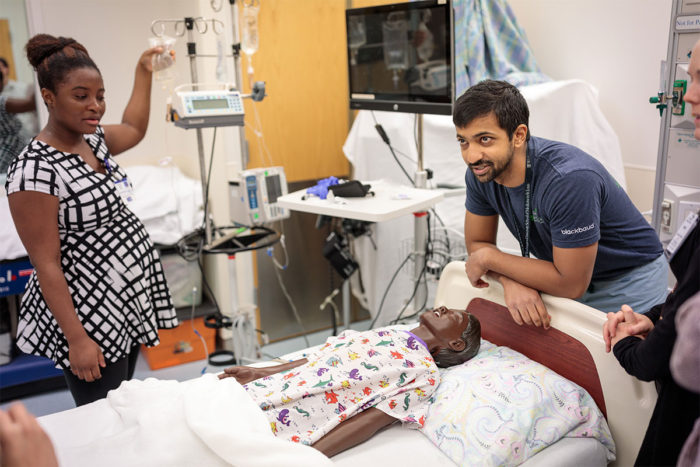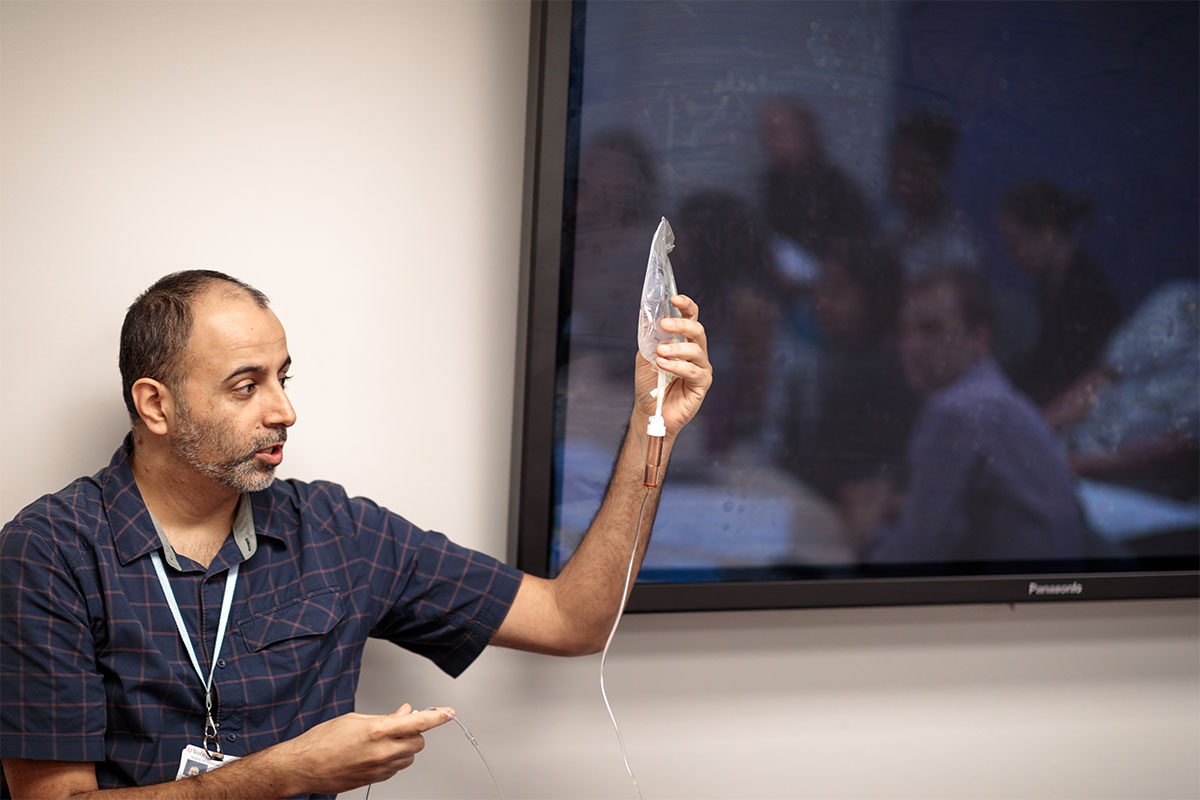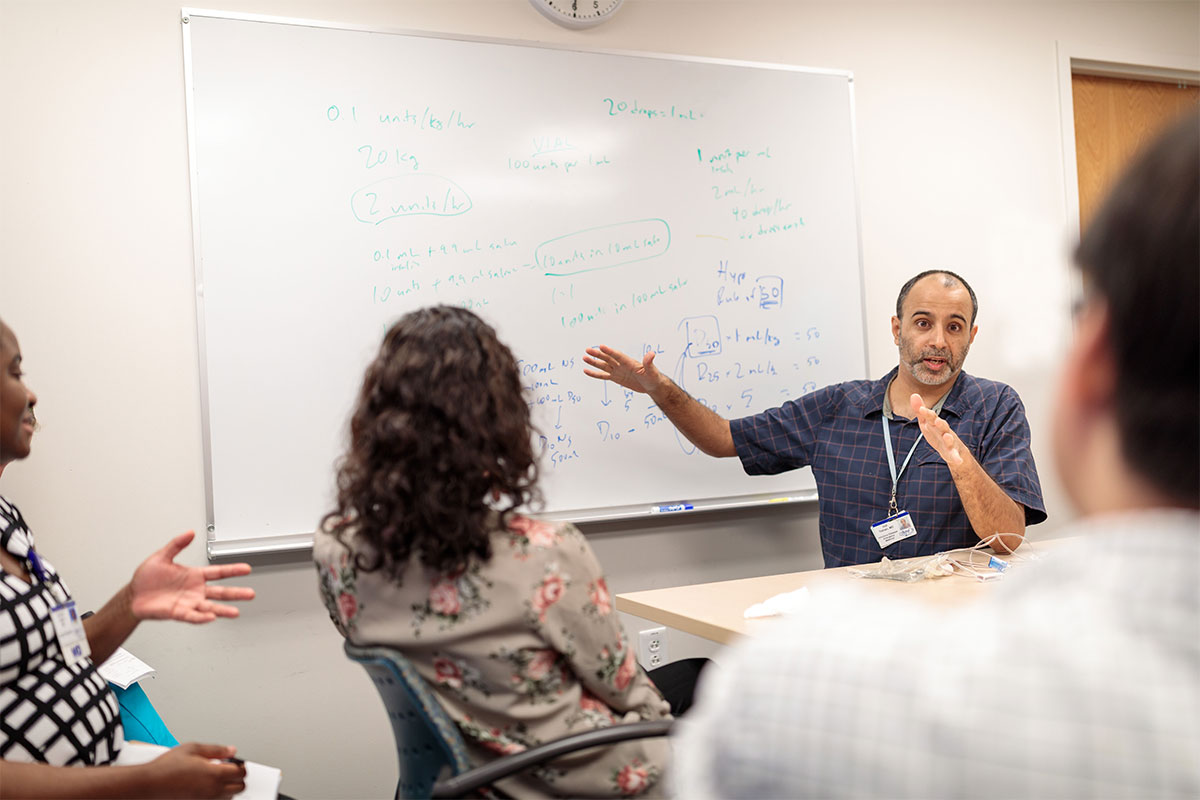Course teaches medical trainees how to provide care in developing countries
'You have to think on your feet and out of the box'
 Matt Miller
Matt MillerMedical trainees (from left) Frances Annan-Fohtung, MD, and Vasanthan Kuppuswamy, MD, at Washington University School of Medicine in St. Louis, use a dummy to practice treating a pediatric patient from a resource-limited country. The Saigh Pediatric Simulation Center at St. Louis Children's Hospital provides medical trainees opportunities to practice clinical care.
A starved supply closet and a lack of basic necessities such as electricity or running water pose significant health risks to patients at medical clinics in poverty-stricken parts of the world, sometimes even more so than illness or disease.
“Many of these patients suffer from common or preventable illnesses that we can routinely and successfully treat in the U.S.,” said Indi Trehan, MD, an associate professor of pediatrics at Washington University School of Medicine in St. Louis who has worked on and off for 11 years in bare-bones clinics and hospitals in Africa and Southeast Asia. “But in resource-limited countries, you have to think on your feet and out of the box. You have to work with what you have, which often isn’t much.”
Trehan reiterated this lesson throughout a recent, two-week crash course on global health that was designed to prepare medical students, residents and fellows for clinical rotations and long-term careers in developing countries. Caring for such patients requires a different mindset for trainees accustomed to working in modern medical centers with updated technology, well-stocked supply closets and access to a full range of medications dispersed by pharmacists who calculate proper dosages.
“You may not have simple things such as urine dipsticks to check glucose in a diabetic,” said Trehan, who also has a master’s degree in public health and a diploma in tropical medicine and hygiene, and is the medical director at Lao Friends Hospital for Children in Luang Prabang, Laos. “You will have to know how to count drips and adjust control valves for IV drips because they’re not computerized.”
 Matt Miller
Matt MillerTrehan co-founded the global health seminar four years ago with Rupa Patel, MD, an assistant professor of medicine in the School of Medicine’s Division of Infectious Diseases. This year’s participants included 14 trainees who practiced diagnosing and treating “patients” in hospital simulation rooms, and visited community organizations in St. Louis that help immigrants and refugees. Additionally, experts at the medical school spoke to trainees about malnutrition, parasitic tropical diseases, international health policies, ethics and cultural sensitivities, among other topics.
“It is essential for trainees interested in global health to understand the challenges of delivering care in resource-limited settings,” said Caline Mattar, MD, currently co-director of the program with Trehan and an assistant professor in the Division of Infectious Diseases. She also oversees the university’s Global Health Scholars Pathway for Internal Medicine and the Global Health Track for Infectious Diseases.
“It’s also important that they are sensitive to their patients’ cultures and the ethics surrounding research and clinical rotations, as well as to social determinants of health,” Mattar said. The latter refers to social and economic factors that may contribute significantly to negative health outcomes.
“Global is also local, and here in St Louis, we witness firsthand the health inequities a few blocks away from our campus,” Mattar said.
“Our goal through this course is to expose our trainees to the challenges both abroad and here, so that they are better equipped to tackle social determinants and inequalities in their daily practice.”
For Colleen Walsh Lang, a fourth-year medical student who also is earning a doctorate in anthropology, the course reinvigorated her longstanding interest in global health. Since 2006, she has been to Uganda half a dozen times, working for up to 11 months at a time with HIV-infected children. “I still have a lot to learn about the practice of medicine in the developing world,” she said. “As a student, I am often the least experienced, no matter where in the world I am helping to treat patients. I appreciated learning about the challenges physicians face when supplies are unavailable or outdated and require ingenuity to make things work.”
For example, the trainees learn how to adjust an infusion rate by counting drops of the IV fluid. They also convert metric units without calculators, and mix and dilute medications. “In a clinical simulation setting, we were expected to be a doctor and perform tasks that nurses or pharmacists do in most U.S. clinics,” said Michael Ripple, a pediatrics resident at St. Louis Children’s Hospital. “It was humbling to think about what it would be like as the only health-care worker in a clinic. These are skills that make us better physicians, no matter where we practice.”
Throughout the course, Trehan emphasized that making substantial improvements in global health do not always require costly, high-tech treatments or technologies. Rather, health often can improve with education, better nutrition and increased affordable access to simple proven interventions. Teaching new mothers about the nutritional benefits of breastfeeding, for instance, can help reduce childhood deaths caused by malnutrition.
Similarly, diabetics can lead healthier lives if their insulin is stored properly. Tropical temperatures can reduce insulin potency, posing serious health risks to diabetic patients who lack access to refrigeration. “We show patients that stashing insulin in a banana tree can keep it cool enough to stay effective,” Trehan said.
Health-care workers also can help patients navigate logistical challenges such as lack of transportation to and from a medical clinic. “Many challenges we attempt to solve overseas also are present in many of our U.S. neighborhoods,” said Randy Laine, a course participant and internal medicine resident at Barnes-Jewish Hospital. “Practicing in global health may mean traveling far away, but it also means caring for immigrants and refugees in our hometown, as well as local people living in poverty.”
Indeed. “Global health is community involvement,” Trehan said. “No matter where a person lives, poverty is linked to poor health, a lack of education and difficulty accessing health care.”
 Matt Miller
Matt Miller






